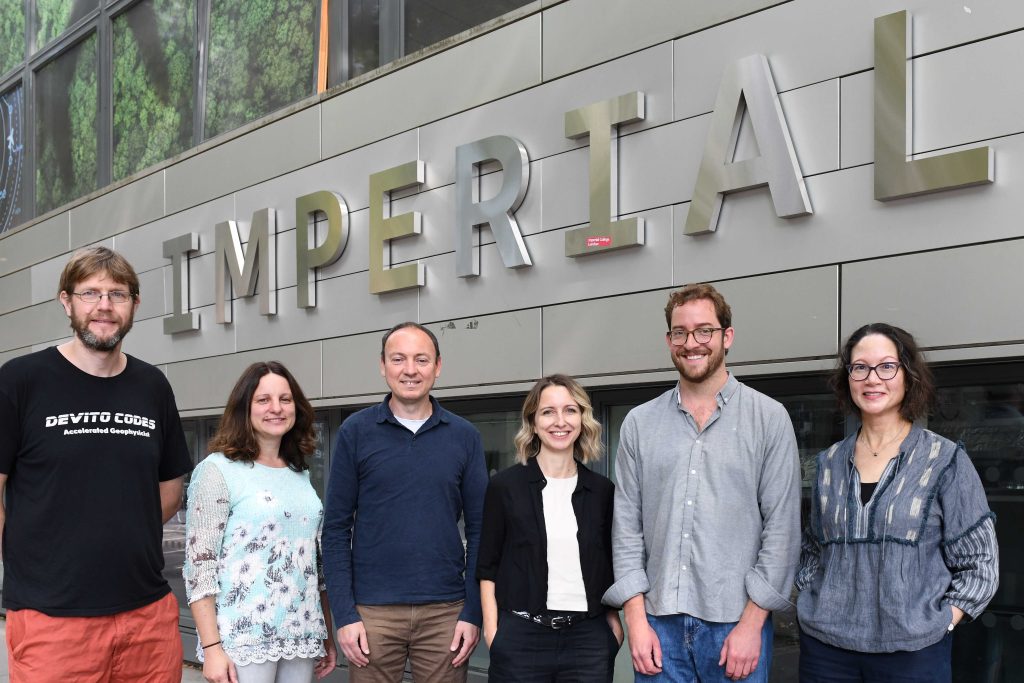
The Artificial Intelligence Futurists from left to right: Rhodri Nelson, Caroline Clewley, Konstantinos Beis, Emma Blyth, Jay DesLauriers and Coco Nijhoff
“Our curiosity in exploring AI is shaped by our individual experiences of Imperial as a community that is open to innovation and positive change.”
As Imperial’s newly appointed Artificial Intelligence (AI) Futurists, we hope to be at the forefront of how our community shapes its response to new technologies, particularly within the education field.
Individually, we are a diverse group and bring our own experiences to these new planning, engagement, and ‘blue-sky-thinking’ positions which will sit within different parts of the university. We are all longstanding members of the community with day jobs across all four faculties; Natural Sciences, Engineering, Medicine and the Business School. We have been in our new roles for several weeks now.
We consider AI to be emblematic of a deeper level of change within our professional and personal lives. When several of us first began our careers, the internet was a tool embedded across daily life in a way that few thought could be substantially ‘bettered’. Then came along social media and smart devices which provide us with significant access to information but can whittle away our time management skills and attention spans. Fast forward a decade, and we now find how we run our offices, our teaching activity, and our homes to be changed beyond recognition in positive and challenging ways. As AI Futurists, we want to support colleagues and students navigate another wave of change, and perhaps apply their approach toward other changes in education, employment, and wider society. Our curiosity in exploring AI very much feels shaped by our individual experiences of Imperial as a community that is open to innovation and positive change.
So, let us introduce ourselves…
Caroline Clewley is currently the lead of the I-Explore programme and project lead of ImpVis – a staff-student project creating interactive visualisations for STEM courses. She has long aimed to enable students to experience meaningful extra-curricular activities, and this is reflected in her role as the Futurist who will be working across the entire university.
Jay DesLauriers is a Teaching Fellow in the Graduate School and is the AI Futurist for the Business School. He sits within the Graduate School’s Research Computing and Data Science group and leads and supports several MSc and BSc modules at the Business School that touch on these topics. His research in the field of cloud computing focuses on improving the management of software across cloud and edge infrastructure, where AI applications are a common use case.
Rhodri Nelson has been appointed in the Faculty of Engineering and hopes to engage with colleagues in the coming months on what matters most to them as AI becomes more embedded across departments. His research interests include the application of complex and numerical analysis to fluid dynamics, geophysics and other engineering related problems. He’s also a senior developer of the Devito Project.
Emma Blyth covers the Faculty of Medicine, a fast-growing area for AI development both in terms of teaching and in its applications in the health service in the UK and overseas. As a senior learning designer, she is passionate about translating the science of learning into effective learning design and exploring the potential of generative AI to enhance skills development in medical education.
Konstantinos Beis represents the Faculty of Natural Sciences – a highly lab-based section of the university, and an area in which AI promises to make great strides in our understanding within the field of life sciences. His lab group is interested in determining the structure and function of proteins to support society to understand drug resistance more fully.
Coco Nijhoff leads the AI Futurists’ overarching objectives, facilitating discussions and communicating the work of the group to the wider College AI Working Party. She is normally responsible for the strategic development and management of Library Services’ Information and Digital Literacy programmes, in alignment with the university’s Learning and Teaching Strategy. Coco has produced an Information and Digital Literacy framework to incorporate generative AI, which will form the basis of the library’s teaching activities across Imperial.
We hope to meet colleagues across the university in the coming weeks and months. If you see us around campuses, do say hello. We will be more visible across Imperial from the beginning of the next academic year. In the meantime, we are keen to remind education staff and students that online resources and primers are readily available to browse over the summer.